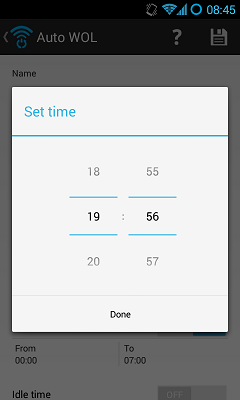Returning value from fragment into parent activity on Android
20 Feb, 2014This post will show you how to return a value set in a dialog fragment back to the parent activity it was called from. Code sample provided here is from the Auto-WOL app I made not so long ago, so if you need the bigger picture, feel free to check TimePickerFragment and DeviceActivity classes over at GitHub. This example uses TimePickerDialog. It also keeps track of the layoutId (where the layout it is bound to acts as a button in the UI) because in my app I have multiple buttons which can invoke the same TimePickerFragment so I needed to know which button invoked the dialog fragment because upon selecting the time the button caption gets updated.
So, to make this whole thing work, we will need a fragment class which will extend DialogFragment and implement TimePickerDialog.OnTimeSetListener. This class will expose the OnTimePickedListener interface so it could later be consumed by the parent activity. This class will also be responsible for registering and calling the callback on time set event. The defined OnTimePickedListener interface has only one method signature - onTimePicked(), which will need to be implemented by the parent activity. Other than this, the class only has a few more overrides and that’s all.
// TimePickerFragment.java
/**
* This class is used so values from TimePickerFragment could be
* returned back to the activity from which it was called.
*/
public class TimePickerFragment extends DialogFragment implements TimePickerDialog.OnTimeSetListener {
OnTimePickedListener mCallback;
Integer mLayoutId = null;
/**
* An interface containing onTimePicked() method signature.
* Container Activity must implement this interface.
*/
public interface OnTimePickedListener {
public void onTimePicked(int textId, int hour, int minute);
}
/* (non-Javadoc)
* @see android.app.DialogFragment#onAttach(android.app.Activity)
*/
@Override
public void onAttach(Activity activity) {
super.onAttach(activity);
try {
mCallback = (OnTimePickedListener)activity;
} catch (ClassCastException e) {
throw new ClassCastException(activity.toString() + " must implement OnTimePickedListener.");
}
}
/* (non-Javadoc)
* @see android.app.DialogFragment#onCreateDialog(android.os.Bundle)
*/
@Override
public Dialog onCreateDialog(Bundle savedInstanceState) {
mCallback = (OnTimePickedListener)getActivity();
Bundle bundle = this.getArguments();
mLayoutId = bundle.getInt("layoutId");
int hour = bundle.getInt("hour");
int minute = bundle.getInt("minute");
// Create a new instance of TimePickerDialog and return it
return new TimePickerDialog(getActivity(), this, hour, minute, DateFormat.is24HourFormat(getActivity()));
}
/* (non-Javadoc)
* @see android.app.TimePickerDialog.OnTimeSetListener#onTimeSet(android.widget.TimePicker, int, int)
*/
public void onTimeSet(TimePicker view, int hour, int minute) {
if(mCallback != null)
{
mCallback.onTimePicked(mLayoutId, hour, minute);
}
}
}The parent activity class implements the OnTimePickedListener defined in TimePickerFragment. This means we are required to override the onTimePicked() method. This method is what gets executed after time has been picked in the dialog pop-up and “Done” confirmation button has been pressed. From here you’re back in your activity class and can do whatever you want with the obtained data.
// DeviceActivity.java
public class DeviceActivity extends BaseActivity implements OnTimePickedListener {
...
/**
* On time picked event, converts hour and minutes values to milliseconds
* milliseconds and sets a new value for the layout in the activity.
* @param layoutId QuietHoursFrom or QuietHoursTo layout Id.
* @param hour Hour value.
* @param minute Minutes value.
*/
@Override
public void onTimePicked(int layoutId, int hour, int minute) {
Long timeInMillis = TimeUtil.getTimeInMilliseconds(hour, minute);
// Here you can do whatever needed with value obtained from the fragment
}
...
}